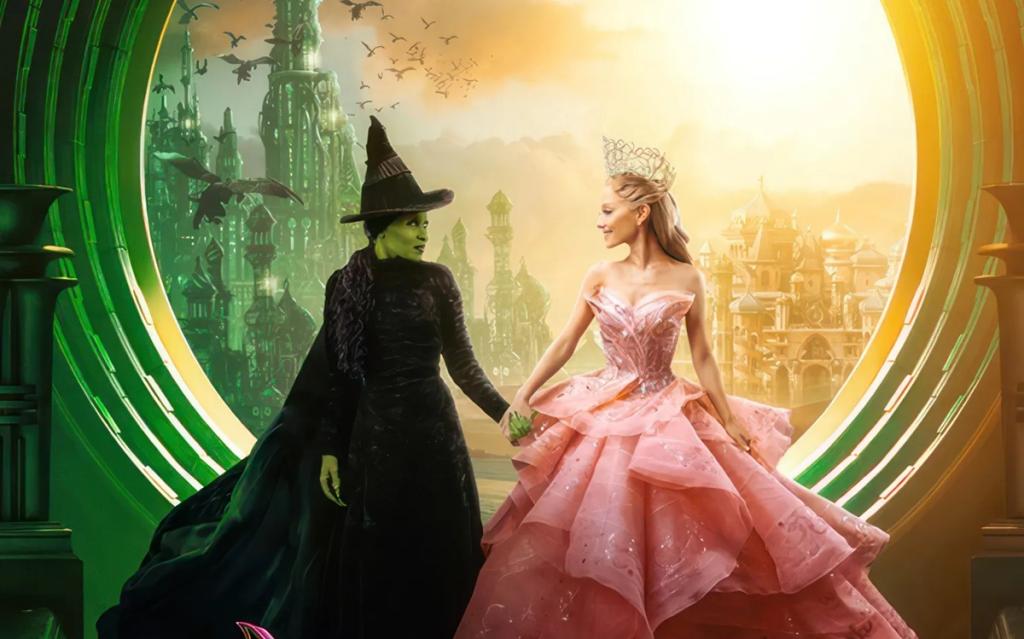For sheer spectacle, it’s hard to beat Wicked, but unless you’ve seen the musical, you may get a bit lost on the way to the Emerald City.
I saw Wicked in a screening at Universal Studios, and my only frame of reference was the 1939 film The Wizard of Oz. But this film is only one link in a very long daisy chain of adaptations, and it’s not even going to be the last one.
The History of Wicked
Director Victor Fleming’s 1939 movie was based, more or less, on a series of novels begun in 1900 by L. Frank Baum with The Wonderful Wizard of Oz (which, interestingly, Baum also turned into a stage musical in 1902).
The original book also inspired the 1974 musical The Wiz: The Super Soul Musical “Wonderful Wizard of Oz” and its 1978 movie version, The Wiz.
(There’s a lot more, so click here for The Hollywood Reporter‘s exhaustive summary of Oz adaptations.)
Then, in 1995, Gregory Maguire wrote the adult-oriented Wicked: The Life and Times of the Wicked Witch of the West, the first of several novels spinning off from Baum’s fictional universe — with a heaping dose of dark dystopia.
Then, along the way to being developed into a movie, the Maguire book took a turn and eventually became a hit 2003 Broadway musical of the same name, with music and lyrics by Stephen Schwartz and book by Winnie Holzman.
I haven’t seen the musical, but I gather that it massively toned down and sanitized many elements of Maguire’s novel (if the summary of the novel at Wikipedia is any indication).
Then, since the new Wicked movie is only half of the musical’s story — there will be at least a part two — and is already 2 hours and 40 minutes long, it must considerably expand upon the stage production.
The Story of Wicked
In brief, this is a prequel of sorts to Baum’s novels, telling the backstory of blonde and beautiful Glinda the Good Witch (Ariana Grande) and the green-skinned Wicked Witch of the West, now called Elphaba (Cynthia Erivo) … L. Frank Baum, get it?
They come together at Shiz University in Oz, where the main sorcery instructor, Madame Morrible (Michelle Yeoh), singles out Elphaba for instruction after she accidentally demonstrates real magical powers.
Glinda — or Galinda, as she starts out being named — is the prototypical popular mean girl. Elphaba, who faces immediate and overt bigotry because she’s green (odd in a place where the capital is literally the Emerald City), is the hated outsider.
But, while Elphaba remains honorable and good until, well, obviously, she takes a turn into the so-called Wicked Witch, Glinda proves to actually have a heart.
The two become fast friends, and ultimately head off to see the Wizard (Jeff Goldblum).
In the middle, there’s a whole subplot about intelligent talking animals suffering from oppression. And, there’s also a goofy prince (Jonathan Bailey), who has a thing for Glinda but also kind of has a thing for Elphaba, who both have a thing for him.
So, How Does Wicked Fit into the Oz-verse?
On Nov. 22, the film’s release day, I had a video chat with director John Chu (Crazy Rich Asians), asking him, in the end, what in the movie is Baum, what is the 1939 movie, what is Maguire, what is Broadway, and what is Chu’s contribution?
He said:
Yes, this was the nightmare of my life to balance plates, but also what a privilege. What a privilege to be based off of the L. Frank Baum novels, which was a close thing that we referenced a lot. We wanted to go back to its roots of even design. The Denslow drawings in those books are just so beautiful.
What kind of animals did they have in Oz? So we can populate our Oz. Oh, everything’s connected by waterways, is how he describes. Okay. So then maybe Shiz needs some waterways in there. Even we have little nods to L. Frank Baum, the man himself, who was very complicated. …
Of course, the ’39 movie. How can you avoid those things, the iconography, the color that they’re doing? And also it does intersect, at least those sort of stories intersect later.
So the spirit of the Wizard of Oz movie, what it evokes in the American fairytale really, that was in my parents when we were raised and in my DNA as I was following the yellow brick road, or chasing to prove myself to this wizard that was going to give me my heart’s desire.
Here’s the whole conversation:
So, Did I Like Wicked?
The film is an overwhelming explosion of color, music and dance. Streamer Peacock has some behind-the-scenes specials that explain that much of what I thought was CGI was actually practical sets, so I was retroactively impressed by that.
Grande and Erivo are vocal talents of the first order, and pretty good dancers as well (especially Grande), and the musical numbers are beautifully and imaginatively choreographed.
As for the story, the idea of two enemies becoming besties but ultimately torn apart by different ambitions and circumstances is just fine. But, since I hadn’t read Maguire’s novel or seen the musical, I did do a lot of head-scratching.
This Isn’t the Oz You May be Expecting
I was trying to relate things back to the 1939 movie, but that won’t get you very far in terms of Shiz University, talking animals and so on — and that movie’s Wizard of Oz is a not the same as this one. The basic outlines of his arrival in Oz are the same, but this Wizard has a very different agenda.
So, there was a fair amount of confusion on my part, and the film felt very long (mostly because it is very long).
The climax is satisfying emotionally — helped by “Defying Gravity” being a great song — but I left with a lot of questions that probably won’t occur to the musical’s fans.
Ultimately, though, to turn a profit on a $145M budget, the film is going to have to attract a whole lot more folks than just those who saw the musical.
Also, while Jonathan Bailey is a great singer and dancer, I never felt like he had any romantic chemistry with either Grande or Erivo, so that left a bit of a hole.
Overall, I enjoyed the music in the film, and Grande’s and Erivo’s performances, but much of the plot didn’t make a whole lot of sense to me. In particular, Elphaba’s switch from good girl to the nemesis of Munchkinland seemed forced and not really earned.
Oh, and the Munchkins aren’t at all like the 1939 film, as director Chu explains here:
My film companion, who saw the musical, said it all made more sense on stage. But, what leaps of logic an audience will accept in a live theatrical spectacular are rather different than what one would expect from a movie — especially a movie that gave itself lots more time to explain things.
And I still loathe those dang flying monkeys.
Should You See Wicked?
The film represents one example of a recent trend toward depicting villains as simply misunderstood, and of making heroes out of antiheroes. But we may have to wait until part two to find out what Elphaba actually does now that she’s known as the Wicked Witch, because she doesn’t do anything bad in part one.
There’s a lot about friendship, which is great. And reviewers have said it’s all about female empowerment, which has now become an entertainment cliche. There doesn’t seem to be any particular sexism in Oz, so in the story, it’s more about being an outsider than specifically being female. But, people bring their own baggage to stories.
In recent decades, there’s also been an embracing of the term “witch” as a representation of female wisdom and knowledge. But since Elphaba was born with her powers rather than earning them through study and effort, not sure how that applies in this particular story.
Basically, Wicked has room in it to encompass whatever you bring to it, including political commentary (which, in what I’ve read and heard, goes every which way, depending on the commentator’s inclinations).
As for sexuality, while the only overt romance in the film is between male and female — and the rating is a fair PG — it’s still flamboyant musical theater, so there’s plenty for everyone in the background. One of Glinda’s hangers-on (Bowen Yang) is obviously gay, but that’s not front and center in the story.
Is Wicked for Kids?
The film’s sheer length would make it challenging for younger kids, and I think some elements of the story would be confusing or even disturbing for grade-schoolers. I’d keep this one at middle-school and up — but the book is an absolute no-go.
Even director Chu — a husband and father of five — told me he was concerned that the movie’s poster is now being attached to the book.
Ultimately, I’m not sure I would have gone to see Wicked if I wasn’t writing about it, but I’m not sorry I did.
And don’t be surprised if you’re humming this on the way out:
Image: Universal Pictures
Don’t miss a thing: Subscribe to all that I write at Authory.com/KateOHare.














